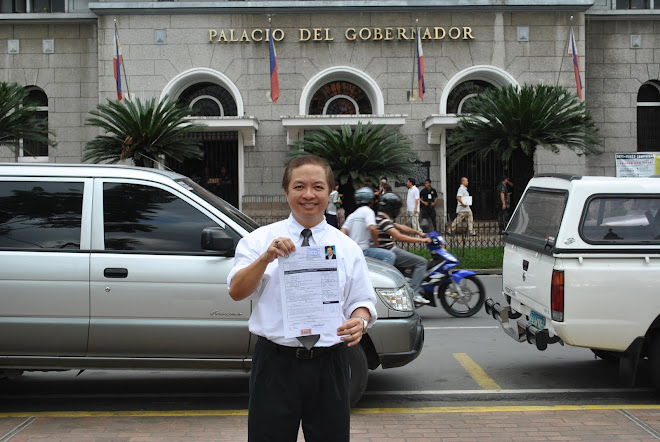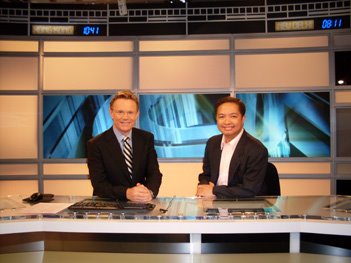Monday, October 13, 2008
Too much pork in the budget
From Cebu Daily News
The problem isn’t that the Constitution doesn’t need amending, because it does; rather, it is that the amendments of interest to those in a position to do something about it, immediately, aren’t of particular interest to the broader electorate. We view any officially-proposed effort to amend the Constitution with mistrust.
Nothing our officials do reduces this mistrust. House Speaker Prospero Nograles, for example, has tried to reassure the public by saying that while he’s convinced efforts to amend the Constitution will take place before the incumbent President’s term ends, Congress will tackle other pending legislative work first. First and foremost being the deliberations on the National Budget for 2009.
Former budget secretary Benjamin Diokno said that this year’s budget is actually more pork barrel-oriented than the 2007 budget. Now budgets for election years have traditionally been stuffed with all sorts of goodies for our elected officials. It’s how presidents and Congress provide funding for the sudden frenzy of public works and other activities to court the electorate’s support.
But why should the 2008 budget actually exceed the 2007 budget in terms of these political goodies? Normally, to prevent massive inflation and restore some fiscal order to the sorely-strained finances of the government, post-election budgets are leaner and less pork-filled. The reason for this, Diokno said, is that we have to realize the useful life of a budgetary item is not one, but two years. This means that if you stuff the 2008 budget now, it not only helps you in 2009, but all the way to the eve of the 2010 elections.
In other words, the 2007 election-oriented budget, bloated as it was, was bloated further because if you think the political funding required for a congressional election last year was big, you ain’t seen nothin’ yet: 2010 will either be a presidential election year, or the year the administration makes a last-ditch effort to campaign for, and win, a plebiscite changing the rules of the game.
So when the Speaker says don’t worry, while we fully intend to amend the Constitution, we will attend to our work first, we have to bear in mind that the two are connected and that the success of the latter depends on the passage of the former. The present budget is a campaign budget, not only providing for our government’s expenses for this year, but sinking funds into the administration campaign kitty for 2010.
Our leaders, ideally, should be stepping in to help form a national consensus so that we can find reforms on which we can agree. Instead, the proposals being floated officially simply aim to limit the electorate’s already limited ability to have a say in what officialdom does. We are increasingly at the mercy of all the sectors that view elections as a means of making a killing every three years, instead of selecting people who can be trusted with the stewardship of public office and public funds. — Manuel Quezon III, Inquirer
The problem isn’t that the Constitution doesn’t need amending, because it does; rather, it is that the amendments of interest to those in a position to do something about it, immediately, aren’t of particular interest to the broader electorate. We view any officially-proposed effort to amend the Constitution with mistrust.
Nothing our officials do reduces this mistrust. House Speaker Prospero Nograles, for example, has tried to reassure the public by saying that while he’s convinced efforts to amend the Constitution will take place before the incumbent President’s term ends, Congress will tackle other pending legislative work first. First and foremost being the deliberations on the National Budget for 2009.
Former budget secretary Benjamin Diokno said that this year’s budget is actually more pork barrel-oriented than the 2007 budget. Now budgets for election years have traditionally been stuffed with all sorts of goodies for our elected officials. It’s how presidents and Congress provide funding for the sudden frenzy of public works and other activities to court the electorate’s support.
But why should the 2008 budget actually exceed the 2007 budget in terms of these political goodies? Normally, to prevent massive inflation and restore some fiscal order to the sorely-strained finances of the government, post-election budgets are leaner and less pork-filled. The reason for this, Diokno said, is that we have to realize the useful life of a budgetary item is not one, but two years. This means that if you stuff the 2008 budget now, it not only helps you in 2009, but all the way to the eve of the 2010 elections.
In other words, the 2007 election-oriented budget, bloated as it was, was bloated further because if you think the political funding required for a congressional election last year was big, you ain’t seen nothin’ yet: 2010 will either be a presidential election year, or the year the administration makes a last-ditch effort to campaign for, and win, a plebiscite changing the rules of the game.
So when the Speaker says don’t worry, while we fully intend to amend the Constitution, we will attend to our work first, we have to bear in mind that the two are connected and that the success of the latter depends on the passage of the former. The present budget is a campaign budget, not only providing for our government’s expenses for this year, but sinking funds into the administration campaign kitty for 2010.
Our leaders, ideally, should be stepping in to help form a national consensus so that we can find reforms on which we can agree. Instead, the proposals being floated officially simply aim to limit the electorate’s already limited ability to have a say in what officialdom does. We are increasingly at the mercy of all the sectors that view elections as a means of making a killing every three years, instead of selecting people who can be trusted with the stewardship of public office and public funds. — Manuel Quezon III, Inquirer
Subscribe to:
Post Comments (Atom)










No comments:
Post a Comment